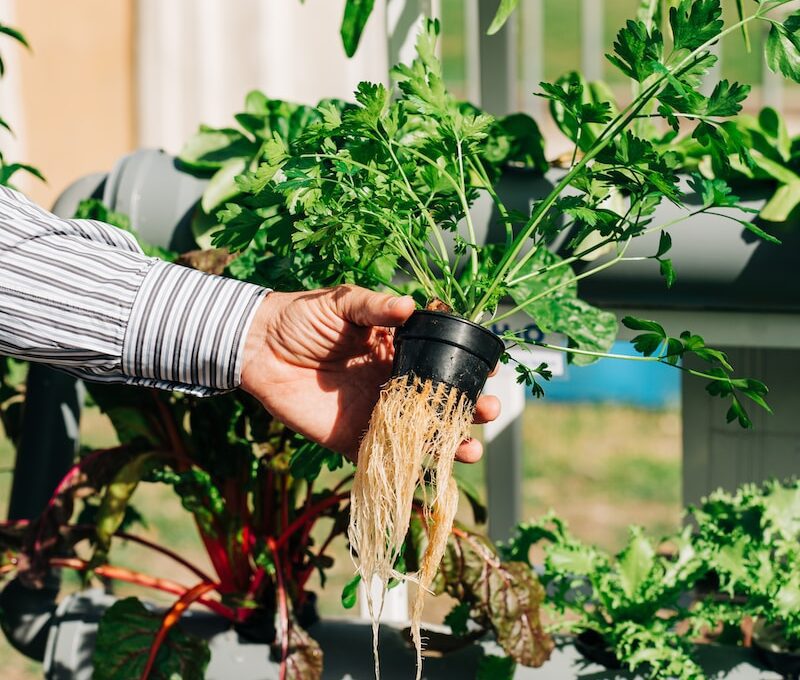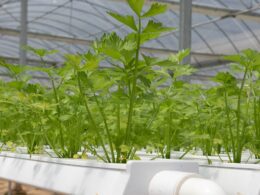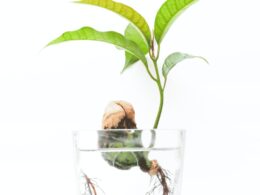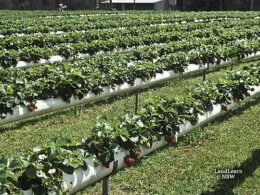Are you interested in hydroponic gardening but wondering if you can grow onions using this method? The answer is yes, you can! Hydroponic gardening involves growing plants in a nutrient-rich water solution instead of soil. It’s a popular method of gardening because it allows you to grow plants indoors, in small spaces, and without the use of pesticides or harmful chemicals.
Growing onions hydroponically is not only possible but also relatively easy. With the right equipment, knowledge, and care, you can enjoy fresh, flavorful onions all year round.
In this article, we’ll explore the requirements for growing onions hydroponically, the best onion varieties for hydroponic gardening, how to plant and care for onions in a hydroponic system, as well as how to harvest and use your hydroponic onions.
So, let’s dive in and learn more about growing onions hydroponically!
Understanding Hydroponic Gardening
You’re going to love how easy it is to grow plants using hydroponic gardening – all you need is a small space and some basic equipment! Hydroponic gardening is a method of growing plants without soil, using a nutrient-rich water solution instead.
One of the biggest advantages of hydroponic gardening is that it allows you to grow plants year-round, regardless of the weather. Another advantage of hydroponic gardening is that it requires less space than traditional gardening methods. Because the plants are grown in water rather than soil, they can be grown closer together and stacked vertically.
This means that you can grow more plants in a smaller area. However, there are also some challenges to hydroponic gardening. You need to make sure that the nutrient solution is properly balanced, and that the plants have enough oxygen.
Despite these challenges, hydroponic gardening is a great way to grow plants indoors or in small spaces. It allows you to control the environment in which the plants grow, and can be a fun and rewarding hobby. With some basic equipment and a little bit of knowledge, you can start growing your own vegetables or herbs using hydroponic gardening today.
Requirements for Growing Onions Hydroponically
To successfully cultivate onions using hydroponics, you’ll need to ensure that the pH levels of the nutrient solution are carefully monitored and adjusted as needed. This is because onions require a pH range between 6.0 and 6.5 to grow optimally. You can use a pH meter or test strips to check the solution’s pH levels and add pH adjusters like potassium hydroxide or phosphoric acid to maintain the desired range.
In addition to pH monitoring, adequate lighting and temperature control are essential for growing onions hydroponically. Vertical farming is a popular hydroponic technique that is suitable for onions. You can use fluorescent, LED, or high-intensity discharge (HID) lights to provide light to your onion plants. Onions require about 12-14 hours of light per day, so you may need to adjust the lighting duration depending on your location and the season.
Lastly, nutrient solutions are crucial for growing onions hydroponically. Onions require a balanced nutrient solution that contains essential macronutrients like nitrogen, phosphorus, and potassium, as well as micronutrients like calcium, magnesium, and iron. You can purchase pre-made nutrient solutions or make your own using fertilizers like hydroponic-specific blends or water-soluble powders.
By providing the right conditions, nutrients, and growing environment, you can successfully grow onions hydroponically and enjoy a bountiful harvest.
Choosing the Right Onion Varieties for Hydroponic Gardening
If you want to maximize your success in hydroponic gardening, it’s important to carefully choose the onion varieties that will thrive in this environment. Here are some best practices for selecting the right seeds:
-
Look for short-day onion varieties. These types of onions require less daylight to grow than long-day onions, making them ideal for hydroponic gardening.
-
Choose onion varieties that are disease-resistant. Hydroponic environments can be prone to disease, so selecting onions that are resistant to common diseases can help ensure a successful harvest.
-
Pick onion varieties that are known for their high yields. This will help you get the most out of your hydroponic garden.
-
Consider the flavor and texture of the onion. While yield and disease-resistance are important factors, you want to make sure you’re growing onions that taste good and have the texture you want.
When it comes to seed selection for hydroponic gardening, the right onion varieties can make all the difference. By following these best practices, you can choose seeds that are well-suited to this type of environment and increase your chances of a successful harvest.
Remember to consider factors like disease-resistance, yield, and flavor when selecting your seeds, and you’ll be on your way to growing delicious onions in your hydroponic garden.
What Alternatives Can Be Used in Hydroponics Instead of Soil?
Hydroponics, an innovative method of cultivating plants without using soil, presents various alternatives. One such option is the use of inert growing mediums, like coconut coir or perlite, which provide excellent drainage and aeration. Another alternative is aeroponics, where plants are grown in a misted environment. By using soil in hydroponics, growers can explore these alternatives for improved plant growth and sustainability.
Planting and Caring for Onions in a Hydroponic System
Planting and caring for onions in a hydroponic system requires attention to detail and careful management of the environment. To start, it’s essential to choose the right lighting for optimal growth. Onions require at least 14-16 hours of light per day, so investing in high-quality LED lights is a must. You should also pay attention to the nutrient solution composition to ensure that your onions receive the necessary nutrients for healthy growth.
An essential component of hydroponic onion cultivation is selecting the right planting medium. Rockwool cubes or coconut coir are excellent choices for onion seedlings. You should sow the seeds at a depth of around ½ inch, and the seedlings should emerge within a week. Once your seedlings have sprouted, you’ll need to thin them out to avoid overcrowding and promote healthy growth. Aim to keep one onion plant per 2-3 inch pot.
Caring for your hydroponic onions is crucial to ensure that they thrive. You should monitor the nutrient solution’s pH level regularly to ensure that it remains between 5.5 and 6.5. You should also maintain a temperature between 65°F and 75°F and ensure proper air circulation. With the right care, your onions should be ready to harvest in around 90-120 days, and you’ll enjoy delicious, fresh onions all year round.
Harvesting and Using Hydroponic Onions
When it’s time to harvest, you’ll be excited to enjoy the fruits of your labor and add some flavorful, homegrown goodness to your meals. Harvesting hydroponic onions is easy and straightforward. Simply pull them out of the growing medium gently, making sure not to damage the roots of other plants in the system.
Once you’ve harvested your hydroponic onions, you may wonder how to preserve them for later use. One option is to store them in a cool, dry place with good ventilation, such as a pantry or root cellar. Another option is to freeze them. To do this, chop the onions into small pieces and place them in an airtight container in the freezer. They’ll keep for up to six months.
Now that you have a fresh supply of hydroponic onions, it’s time to get creative in the kitchen. There are endless possibilities for using onions in your cooking. Some classic recipes include French onion soup, onion rings, and caramelized onions. You can also add them to salads, stir-fries, and soups for a burst of flavor and nutrition. Experiment with different recipes and techniques to find your favorite way to use your homegrown hydroponic onions.
Frequently Asked Questions
What is the cost of setting up a hydroponic system for growing onions?
If you’re considering setting up a hydroponic system for growing onions, there are a few things to consider. One of the benefits of hydroponic onion farming is that it allows you to control the growing environment and optimize conditions for maximum yield.
However, there are also some drawbacks to this method, such as the initial setup costs and ongoing maintenance. When comparing hydroponic onion yields to traditional methods, it’s important to note that hydroponic systems can produce higher yields in a smaller space, but may also require more attention to detail.
Overall, the cost of setting up a hydroponic system for growing onions varies depending on the size and complexity of the system, but it may be worth it for the potential benefits in yield and control over the growing environment.
Can hydroponic onions be grown outdoors or is an indoor setup necessary?
If you’re considering growing onions hydroponically, you’ll be happy to know that outdoor hydroponic setups are possible. However, it’s important to choose the right variety of onion for hydroponic growth. Some onion varieties, such as Walla Walla and Vidalia, are better suited for outdoor hydroponics than others.
When it comes to growing onions in a hydroponic system, it’s important to remember that they need a lot of light and nutrients to thrive. With the right setup and care, you can grow healthy, flavorful onions in your outdoor hydroponic garden.
How long does it typically take for hydroponic onions to mature?
To grow hydroponic onions to maturity, it typically takes around 4-5 months. Optimal growing conditions include a pH range of 6.0-6.5 and a nutrient solution with balanced levels of nitrogen, phosphorus, and potassium.
It’s important to monitor the water level and maintain proper lighting and temperature. When it’s time to harvest, use clean scissors or a knife to cut the mature onion at the base, leaving the roots intact.
Store the onions in a cool, dry place for best results. With these tips and techniques, you can successfully grow and harvest hydroponic onions.
Are hydroponic onions more prone to pests and diseases than conventionally grown onions?
Hydroponic onions can be a great choice for small scale farming, but they can be prone to pests and diseases. However, there are pest control techniques that can be used to prevent and manage these issues.
One benefit of growing hydroponic onions is that they can be grown without soil, which can reduce the risk of soil-borne diseases. Additionally, hydroponics allows for precise control over growing conditions, which can result in higher yields and healthier plants.
Overall, with the right care and attention, hydroponic onions can be a successful and profitable crop for small scale farmers.
Can hydroponic onions be used for canning or pickling?
If you’re wondering whether to can or pickle your hydroponic onions, the answer depends on your personal preference.
Canning involves cooking the onions in a jar with vinegar and other seasonings, while pickling involves soaking the onions in a brine solution. Both methods can preserve the onions for long periods of time and provide a delicious addition to meals.
Additionally, hydroponic onions offer nutritional benefits such as higher levels of antioxidants and vitamins compared to conventionally grown onions. So, whichever method you choose, you can feel good about the health benefits you’re getting from your hydroponic onions.
Conclusion
So, can onions be grown hydroponically? The answer is yes!
Hydroponic gardening is a great way to grow onions without the need for soil. It allows you to control the growing environment, which can lead to healthier and more productive plants.
To grow onions hydroponically, you’ll need to make sure you have the right equipment and nutrients. You’ll also need to choose the right onion varieties and follow proper planting and care techniques.
With a little patience and attention, you can harvest onions that are just as tasty and nutritious as those grown in soil. So, give it a try and see if hydroponic gardening is right for you!









